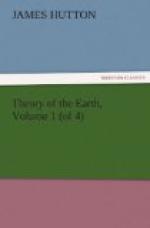The second are formed in a great measure of marine productions, are often no less consolidated than those of the first class, and frequently no less changed in their natural shape and situation.
The third again have for character, according to this learned theorist, the containing of those organised bodies which are proper to the earth, instead of those which in the second class had belonged to the sea; in other respects, surely there is no essential difference. It is not pretended that these tertiary strata had any other origin, than that of having been deposited in water; it is not so much as suspected, that this water had been any other than that of the sea; the few marine bodies which M. Pallas here acknowledges, goes at least to prove this fact: and with regard to the mineral operations which had been employed in consolidating those water formed strata, it is impossible not to be convinced that every effect visible in the other two are here also to be perceived.
From this view of mineral bodies, taken from the extensive observations of the Russian dominions, and from the suppositions of geologists in relation to those appearances, we should be led to conclude that the globe of this earth had been originally nothing but an ocean, a world containing neither plant nor animal to live, to grow and propagate its species. In following a system founded on those appearances, we must next suppose, that to the sterile unorganised world there had succeeded an ocean stored with fish of every species. Here it would be proper to inquire what sustained those aquatic animals; for, in such a system as this, there is no provision made for continuing the life even of the individuals, far less of feeding the species while, in an almost infinite succession of individuals, they should form a continent of land almost composed of their exuviae.
If fish can be fed upon water and stone; if siliceous bodies can, by the digesting powers of animals, be converted into argillaceous and calcareous earths; and if inflammable matter can be prepared without the intervention of vegetable bodies, we might erect a system in which this should be the natural order of things. But to form a system in direct opposition to every order of nature that we know, merely because we may suppose another order of things different from the laws of nature which we observe, would be as inconsistent with the rules of reasoning in science, by which the speculations of philosophy are directed, as it would be contrary to common sense, by which the affairs of mankind are conducted.




